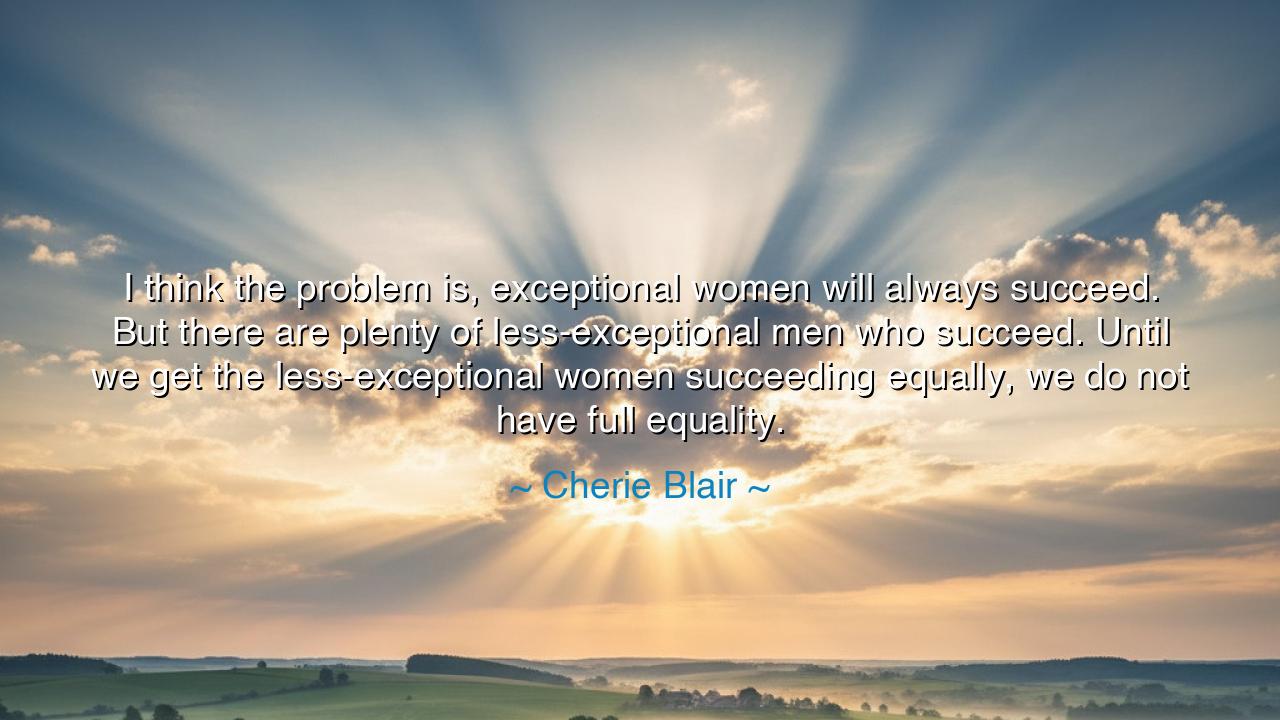
I think the problem is, exceptional women will always succeed.
I think the problem is, exceptional women will always succeed. But there are plenty of less-exceptional men who succeed. Until we get the less-exceptional women succeeding equally, we do not have full equality.






In the wise and piercing words of Cherie Blair, a woman of intellect and conviction, there burns a truth that exposes the hidden imbalance of our age: “I think the problem is, exceptional women will always succeed. But there are plenty of less-exceptional men who succeed. Until we get the less-exceptional women succeeding equally, we do not have full equality.” This statement, sharp as a blade and yet heavy with compassion, cuts to the heart of modern society’s silent injustice. It speaks not merely of ambition or success, but of fairness—of how the scales of opportunity still lean unevenly, favoring the average man over the gifted woman. Blair’s words remind us that true equality is not achieved when a few extraordinary women rise to greatness, but when ordinary women are allowed to stand shoulder to shoulder with their male peers, unburdened by double standards.
The meaning of this quote lies in its recognition that inequality today is not always overt—it hides in subtle structures and quiet assumptions. In every generation, there have been exceptional women who broke through barriers by sheer force of will—women like Marie Curie, Rosa Parks, Amelia Earhart, and Malala Yousafzai. They rose, yes, but their rise often came at great personal cost, and it was seen as the rare triumph of the few rather than the rightful progress of the many. Blair’s wisdom pierces this illusion: when we celebrate only the extraordinary woman, we make her the exception that proves the rule of inequality. True justice will come not when a few women reach the summit, but when every woman has the right to climb without the mountain itself resisting her ascent.
The origin of Blair’s words is rooted in both her personal journey and her keen observation of the world she helped shape. As a barrister, a human rights advocate, and the wife of a Prime Minister, Cherie Blair saw the inner workings of power and progress. She witnessed how institutions, though reformed in law, often remained unchanged in culture—how women, even in positions of authority, had to outshine their male counterparts to earn the same respect. Her statement arises from this lived truth: that progress measured by the success of prodigies is hollow unless it lifts the common woman—the worker, the mother, the student—into equal standing with the common man.
History itself offers a reflection of her message. Consider the era of Queen Elizabeth I, a woman of staggering intellect and will, who ruled an empire in a time when women were denied the right to govern even their own households. She was revered not because her age accepted women as equal, but because she transcended her age through genius. Yet when she died, the gates did not open for other women; her brilliance became proof that she was an exception, not an example. Centuries later, women would still be told, “You can succeed—if you are extraordinary.” Blair’s insight confronts this enduring injustice, declaring that equality must extend beyond the realm of the extraordinary, into the soil of everyday life, where the ordinary person toils and dreams.
Her words also reveal a profound truth about systems, not souls. The issue is not that women lack talent or drive, but that the world’s structures were built long ago in favor of men and have not yet been fully reshaped. In workplaces, in politics, in science, and in art, mediocrity among men is often rewarded, while women must prove perfection to earn a place. Blair reminds us that equality will not be complete until society normalizes the idea of women who are simply “good enough” being allowed to thrive—just as men have for centuries. Only then can we say that merit, not gender, governs the outcomes of life.
There is a quiet heroism in this perspective. It demands not only the celebration of greatness, but the creation of fairness. It calls for teachers who encourage every girl, not just the prodigy; for employers who see potential beyond gendered expectation; for governments that shape policy not for the exceptional case, but for the collective good. It asks that we dismantle the hidden gatekeepers of success—the biases that whisper, she must prove more, do more, be more. For only when the average woman can live and work with the same ease as the average man, can society claim to have fulfilled the promise of equality.
Therefore, O seeker of justice, take this lesson deeply into your heart: honor the exceptional, but fight for the ordinary. Do not let the success of a few blind you to the struggle of the many. Build systems that lift all, not just those born with extraordinary resilience. Encourage fairness in your home, your workplace, your community—wherever the quiet hierarchies of expectation linger. When a society creates room for every woman—not just the gifted, the bold, or the lucky—to live and succeed with dignity, it becomes whole.
And so remember the wisdom of Cherie Blair: equality is not proven by the brilliance of the few, but by the opportunity of the many. The measure of progress is not how high the exceptional can fly, but how far the ordinary can walk without stumbling. For when the less-exceptional woman stands freely beside her equal, without apology or struggle, then—and only then—shall humanity call itself truly just.






AAdministratorAdministrator
Welcome, honored guests. Please leave a comment, we will respond soon